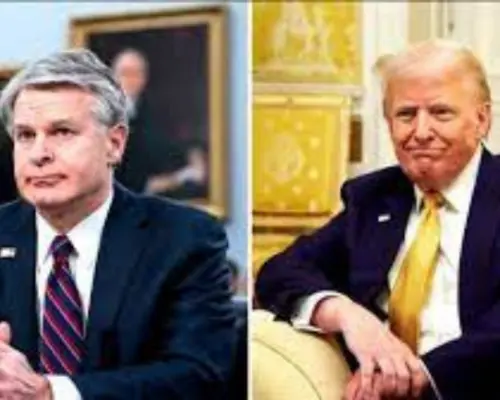This action sets the stage for Kash Patel’s contentious nomination and was motivated by political pressure and Trump’s criticism.
This essay will examine Chris Wray’s motivations, the difficulties he faced during his tenure, and the ramifications for the FBI under the incoming administration. Let’s explore this crucial juncture in American law enforcement.
Why Did Chris Wray, the Director of the FBI, Step Down?
Chris Wray’s retirement represents a sea change for the FBI. He resigned in order to facilitate a seamless transition and uphold the integrity of the FBI in a contentious political climate.
Donald Trump, who publicly blamed Wray for the probes into his handling of secret data, began to criticize him more and more.
In a letter expressing a lack of confidence, Senate Republicans Chuck Grassley and others questioned Wray’s leadership, which further increased internal pressure.
Because of these circumstances, Wray’s resignation was motivated as much by preserving the FBI’s autonomy as it was by avoiding termination on January 20, 2025.
Wray stressed his dedication to the FBI’s principles in his address, characterizing his choice as one that was “resolved” in spite of his own sorrow.
Who Will Take Chris Wray’s Place as FBI Director?

Trump supporter Kash Patel is expected to assume leadership as the next FBI director. Patel’s goal to “root out the Deep State” and his tight relationship with Trump are well-known.
Patel has a history of being an influential member of Trump’s government and openly endorsing divisive policies.
His appointment has generated controversy, meanwhile, as some worry that his leadership could further politicize the FBI.
FBI Director Chris Wray’s Tenure Timeline
Crucial moments occurred during Chris Wray’s tenure, which lasted from 2017 to 2025.
Wray, who was appointed following the firing of James Comey, had to deal with investigations into Hillary Clinton’s email use and Russian meddling in the 2016 election.
What Effect Will Wray’s Resignation Have on the FBI?
The independence of the FBI is seriously called into question by Wray’s resignation. His resignation serves as a reminder of how even sheltered positions like the director of the FBI may be impacted by outside political forces.
Concerns have also been raised regarding Kash Patel’s leadership leading to increased politicization.
Opponents worry that Patel’s strong connections to Trump may jeopardize the FBI’s objective of delivering fair justice. Seth Moulton and other lawmakers have cautioned about the dangers of making the FBI a “tool of the state.”
However, proponents of the shift contend that Patel will implement urgently needed reform. The argument emphasizes the fine line that must be drawn between upholding the FBI’s integrity and adapting to changing political environments.
Also read:-Gina Raimondo’s Huge Net Worth Due To Political And Financial Success

